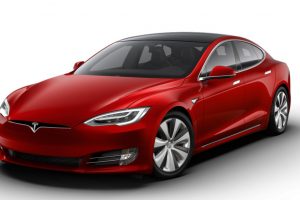A new study suggests that the global electric vehicle market will multiply in valuation by five times by 2030, based on new data acquired by Allied Market Research.
The 2020 EV market size was valued at $163.01 billion, a sizeable figure considering the sector’s relatively low share compared to that of combustion engine vehicles. With several large-scale automotive companies with storied histories transitioning to electric vehicles, these companies will supplement the smaller, EV-focused companies, like Tesla, Rivian, and Lucid, contributing large-scale production operations with relatively limitless amounts of capital.
The new study says that the global EV sector will reach $823.74 billion by 2030, at a compound annual growth rate (CAGR) of 18.2 percent.
The report also includes both PHEVs and FCEVs in the overall EV sector. However, the study also confirms that BEVs have dominated the sector, “accounting for more than three-fourths of the global electric vehicle market.”
According to IBISWorld.com, the global automotive industry will be worth $2.8 trillion this year, a 4 percent increase from its valuation in 2021. More competition, more technological advances, and an everchanging background of consumer wants are driving the electrification industry to grow exponentially over the next several decades. However, in the short term, as in up until the end of the decade, Allied Market Research expects the market to saturate and expand, especially as the cost of driving a combustion engine vehicle continues to bubble, giving consumers more incentive to drive an electric powertrain.
Allied Market Research suggests that there are several factors that are driving consumers to consider EVs, but the biggest seems to be the issue of cost.
“Surge in fuel costs, rise in need for fuel-efficient, low-emission, and high-performance vehicles, and strict governmental rules about vehicle emissions drive the growth of the global electric vehicle market. Moreover, reduction in cost of electric vehicle batteries supplements the market growth,” the report states. “However, high manufacturing cost, lack of infrastructure for charging, and range anxiety and serviceability hinder the market growth. On the contrary, technological advancements, development of self-driving electric vehicle technology, and proactive government initiatives are expected to open new opportunities for the market players in the future.”
The study also looks into the regions that are highly associated with EVs, like Europe and Asia. Allied Market Research said:
“By region, the market across Asia-Pacific, followed by Europe and North America, held the largest share in 2020, accounting for nearly half of the market, due to rise in vehicle population and surge in vehicle standards. However, the global electric vehicle market across Europe is anticipated to register the highest CAGR of 20.6% during the forecast period, owing to rise in environmental concerns and strict emission norms set by European governments and environmental agencies.”
Without a doubt, the EV sector is primed for a major expansion in the coming years. With legacy automakers like Ford, General Motors, and others committing to fully-electric lineups in various timeframes, the global EV industry has nowhere to go but up. Additionally, the legacy automakers are riding the coattails of the full-EV manufacturers, who are disrupting the industry more than ever before. In perhaps the largest technological transition to a sector in history, the automotive sector is looking to basically rework its entire concentration in the next 10 to 15 years. As the transition becomes more prevalent moving forward, the combustion engine market will begin to hinder, while EVs continue to snap up more of the global market share.





